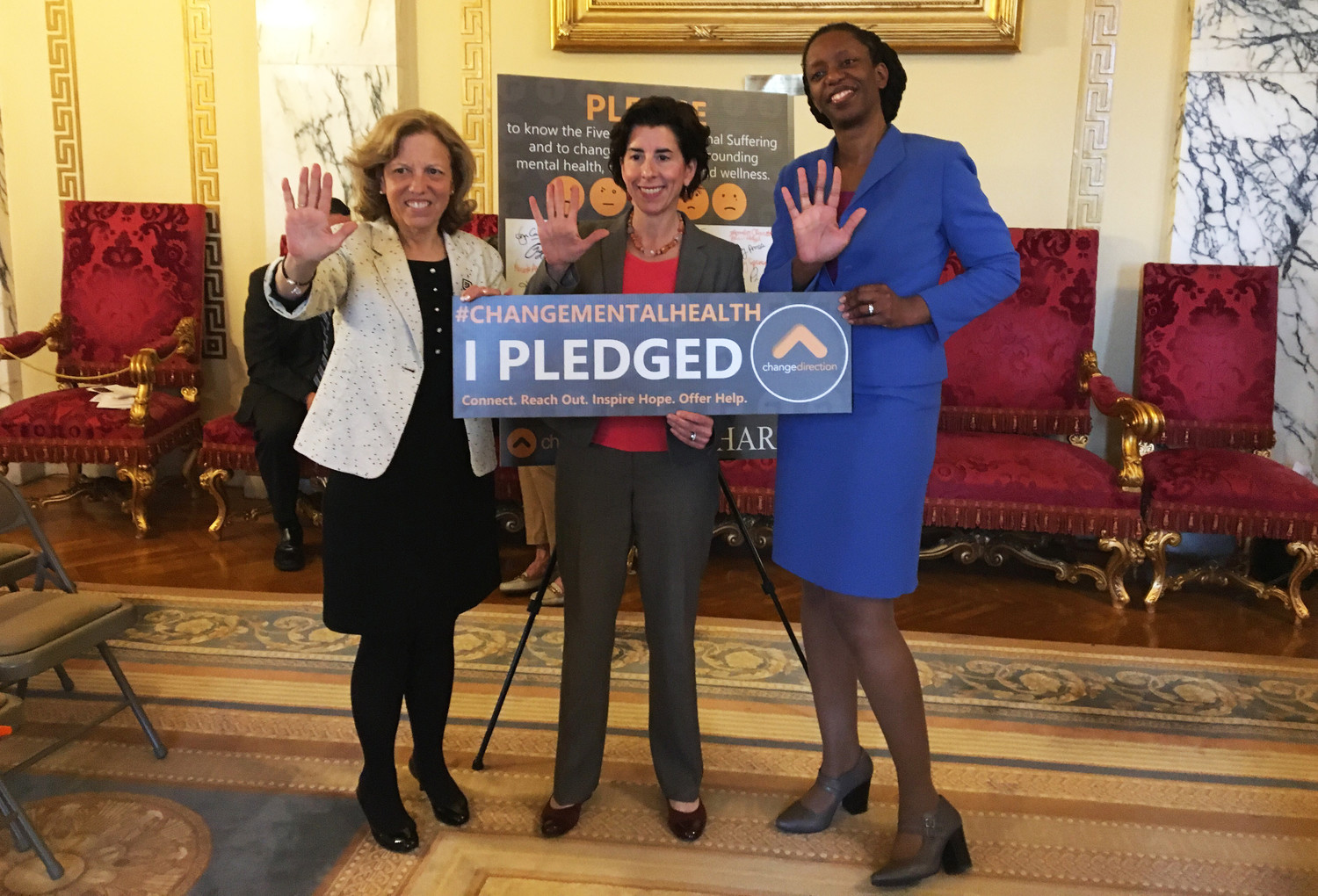Mind boggling numbers for major depression diagnoses in RI
An interview with Dr. Matt Collins, vice president of Clinical Integration at Blue Cross and Blue Shield of Rhode Island, talking about the reasons why the state leads the nation in major depression diagnoses
PROVIDENCE – May is mental health awareness month, and as part of that effort, the Hospital Association of Rhode Island has been engaged in a statewide public outreach campaign, promoting awareness of the five signs of depression, as well as the five healthy habits of emotional well-being, handing business card-sized reminders, with the goal of helping people “change direction.”
The five signs of depression listed on the card include: Not feeling like u? Feeling agitated? R u withdrawn? Caring 4 yourself? Feeling hopeless?
On the reverse side, the five healthy habits of emotional well-being include: Take care of you, check in with others, engage friends & family, relax and reduce stress, and know the five signs.
The “five signs” effort as part of the Campaign To Change Direction was highlighted at a May 3 event at the State House, sponsored by the Mental Health Association of Rhode Island, whose theme this year is: whole body + whole mind = whole health. The focus of this year’s efforts, according J. Clement Cicilline, president of the board of directors of MHARI, is to ensure that “persons with mental illness know their rights and have access to affordable, good quality of care, just like anyone else in need of medical services.”
The larger context, perhaps, is to ask: What is the best way to respond to the ever-increasing number of major depression diagnoses in Rhode Island?
The mental health landscape
What is known as the Truven Report, four analytical studies conducted by Truven Health Analytics and released in September of 2015, provided an in-depth look at Rhode Island’s behavioral health care landscape, from a cost, supply demand and infrastructure analysis.
At the time the studies were released, the hope was that they would serve as the framework to develop a new coordinated system of behavioral and mental health care in the state, looking to create a continuum of care, focused on population health. [See link below to the ConvergenceRI story, “Looking for a sanity clause in Rhode Island.”]
As reported by ConvergenceRI at the time, the Truven studies found:
Children in Rhode Island faced greater economic, social, and familial risks for the development of mental health and substance use disorders than children in other New England states and the nation.
Unemployment among parents in Rhode Island is higher than in other New England states, more children live in single parent households, more children have inconsistent insurance coverage, and one in five children in Rhode Island is poor.
“These socio-economic challenges help explain why children and adolescents in Rhode Island experienced higher rates of adverse childhood events and subsequent behavioral health conditions such as ADHD, major depression, and illicit drug use than children and adolescents in other New England states and nationally,” the study said.
Further, the study continued, such “higher risk factors are expressed in adulthood as higher prevalence rates of disease.” Adults in Rhode Island have higher rates of drug abuse and dependence and serious psychological distress than other New England states and the national averages.
Translated, the early stressors in childhood and adolescence often blossom and flower into higher rates of depression and substance use disorders.
Mind boggling numbers on depression
No one, then, should have been surprised when a recent Health of America report issued by the Blue Cross Blue Shield Association, entitled “Major Depression: The Impact on Overall Health,” found that Rhode Island led the nation in major depression diagnoses.
While the national depression diagnosis rate averages 4.4 percent, Rhode Islanders are diagnosed at a rate of 6.4 percent.
Overall, the study found that major depression is the second most “impactful” condition on overall health [outcomes] for insured Americans, outranked only by high blood pressure.
As Dr. Matt Collins, vice president of Clinical Integration at Blue Cross and Blue Shield of Rhode Island, wrote in a recent op-ed: “In Rhode Island, women and millennials [aged 18-34] feel the impact most seriously, with diagnosis rates at 8.5 percent and 6.3 percent, respectively.”
Collins continued: “For Rhode Islanders – and particularly those in the Rhode Island medical community – these numbers are further confirmation that we must effectively address and support the mental health needs of our community, particularly when considering the impact mental health diagnoses have on the greater health care system.”
In particular, Collins cited two findings in “The Health of America” report:
• Those diagnosed with major depression are nearly 30 percent less healthy on average than those not diagnosed. This decrease in overall health translates to nearly 10 years of healthy life lost for both men and women.
• Similarly, chronic conditions are strongly linked to major depression, as 85 percent of people who are diagnosed with major depression also have one or more serious chronic health conditions.
In his op-ed, Collins went on to plug three programs that Blue Cross and Blue Shield of Rhode Island has begun to improve access and care coordination, as well as to remove barriers and stigma. They include:
• Policy changes to remove prior approval requirements for in-network mental health or substance use disorder services, and to make co-pays/coverage for such outpatient visits the same as co-pays/coverage for primary care visits.
• The “Mindful Teen” initiative, a collaboration with Bradley Hospital, to promote alternatives to inpatient hospitalization for children and teens facing mental illness.
• The continued investment in HealthPath, a partnership with Continuum Behavioral Health, a for-profit division of The Providence Center, to provide wrap-around services for Blue Cross members in a comprehensive, coordinate manner.
Here is the ConvergenceRI interview with Dr. Matt Collins, exploring some of the reasons behind why Rhode Island has such a high number of major depression diagnoses, and what can be done about it.
ConvergenceRI: Are you familiar with the work of sociologist Shannon Monnat and her research around the diseases of despair, looking at the mortality rates for alcohol, drugs and suicide? She found that in Rhode Island, analyzing CDC mortality statistics, between 2010 and 2014, some 60 percent of all deaths for white adults, male and female, between the ages of 25-34, were from alcohol, suicide and drugs, the highest such rate in the nation. Those findings seem to correlate well with the findings for millennials from the Blue Cross study, identifying a high rate of major depression diagnoses for the age group 18-34.
COLLINS: I had never heard of her work [before you sent me the question in advance of the interview]. I am more familiar with the data on the rates of morbidity in African-American women, and the high rates of infant mortality in underserved communities. I practiced as a family physician in underserved communities during my first 18 years in practice, at a community health center and on the campus at Memorial Hospital.
[What I observed] was the impact of being economically depressed, the impact of the stress of housing fragility, income insecurity, and scarcity of fresh food.
[The question we need to ask is]: why does Rhode Island have such a high rate of behavioral health morbidity, despite having two of the greatest psychiatric hospitals in the nation [Bradley and Butler]? And, a top-ranked medical school? Why is there such a high rate of utilization, way more than any other place?
A few years ago, when I posed a similar question to the behavioral health community in Massachusetts, about what would explain this high morbidity [in Massachusetts], mostly what I got in response was shrugs.
Rhode Island, because of its relative small size, [can be considered] a city-state, with [a high percentage] of an urban population. There is an economic security factor.
When I looked at the depression frequency in metropolitan service areas, in Boston, in Springfield, in New London – in New London, there are the exact same percentages for major depression diagnoses as in Rhode Island, 6.3 percent total, 8.2 percent among women, 6.1 percent for millennials; what you could find in common are conditions of economic instability.
We’ve got to figure this out.
ConvergenceRI: How would you describe the continuum between mental illness and mental wellness?
COLLINS: In thinking about that, it’s hard to define mental wellness. It’s much easier to define well-being as part of physical health.
In the Truven Report, they attempted to look at the social determinants of behavioral health morbidity, such as intergenerational substance use and adverse childhood experiences creating a high risk of mental illness.
[In response, we need to look at how] to build community resiliency, using social services and supports, with early screening and intervention, in order to break the cycle from one generation to the next.
ConvergenceRI: At the SIM Steering Committee meeting, in discussing workforce training and community health worker initiatives, there was a repeated emphasis on embracing “trauma-informed” care. Is that something that should be more widely embraced?
COLLINS: Trauma-informed care is an approach. Speaking as a family physician, it is a way to approach the patient to try and discover what past trauma may have triggered their current morbidity.
ConvergenceRI: Screening for depression has now become more integrated into primary care practices. What kinds of interventions are available once depression has been diagnosed?
COLLINS: Screening for depression is widely done now in primary care and other settings, practices that are now a standard part of patient intake in primary care practices and in patient-centered medical homes.
[In my work as a family practice physician], we conduct depression screening for 100 percent of all office visits. Some 50 percent of those screened were positive.
Because of Care Transformation Collaborative behavioral health integration, primary care practices share collaborative relationships with behavioral health providers incorporated into their practices, including social workers and counselors.
Coastal Medical, for instance, has an embedded psychologist in their group.
We can screen, treat and refer for depression, which is great; there are new payment codes that account for such work.
The more people who are being screened, the more there is a regular opportunity for routine care.
ConvergenceRI: Another observation that emerged at the SIM meeting as part of the presentation by the South County Health community health team was the fact that, with one patient, the team had difficulty finding a bed in a psychiatric facility, because they were told none were available, which surprised many around the table.
COLLINS: Bed availability is a factor that can lead to difficulty. Often, with a patient, there is a co-occurrence of an illness, or a developmental disability, or an issue of substance use that can make the case complicated.
In Rhode Island, we do have a lot inpatient beds here. Sometimes, there can be a bottleneck; sometimes it could be related to an insurer’s denial.
ConvergenceRI: The Hospital Association of Rhode Island recently launched a statewide campaign promoting awareness of the five signs of depression. What do you think of the campaign?
COLLINS: It is a fantastic campaign. The whole population should know what the signs of depression and mental distress are.







